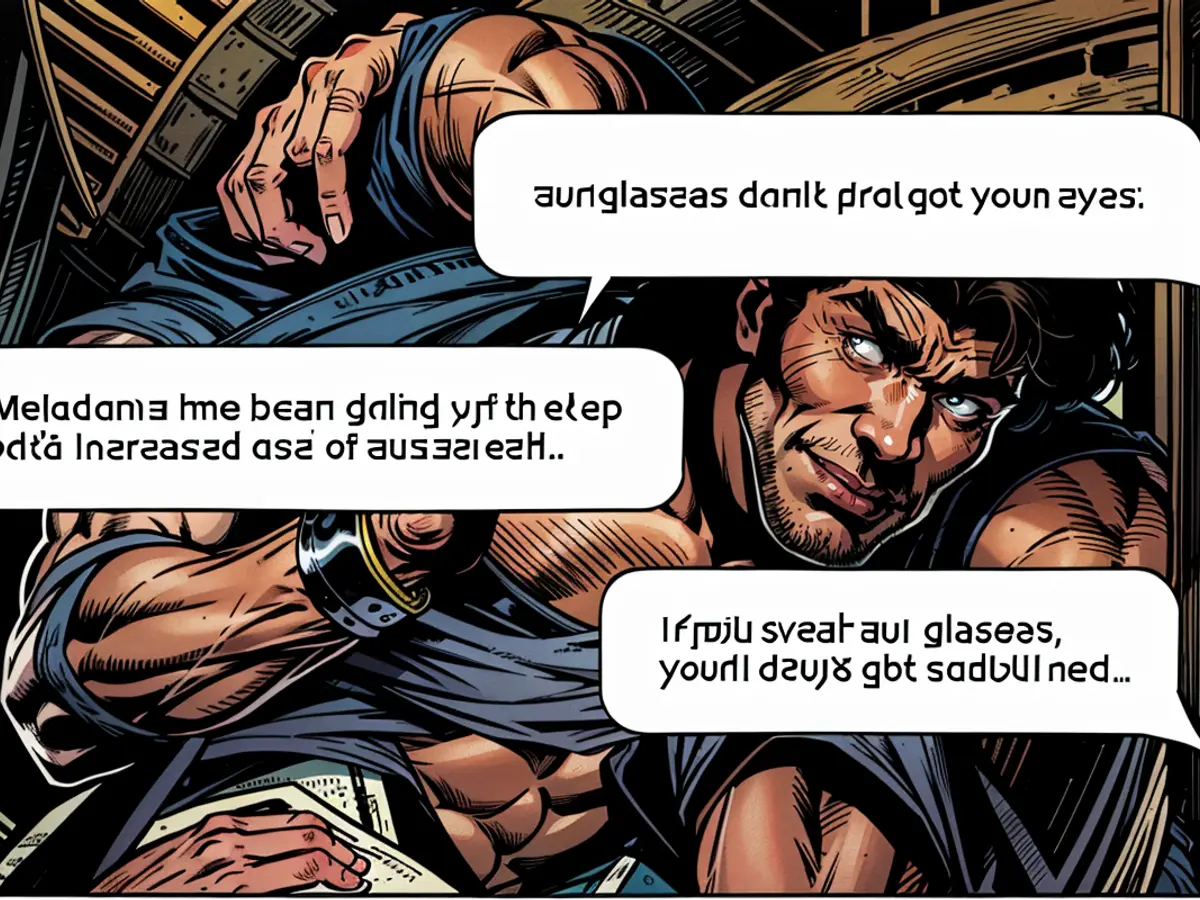'Alarming: The Twist in Reality Surrounding Sun Exposure on Social Media'
"Chuck those sunscreen bottles," advises a TikTok influencer boasting 1.6 million followers and 36 million likes.
"Spending time outdoors reduces the chances of getting sunburned," declares a shirtless TikTok user with almost 90,000 followers and over 11 million likes.
"The sun doesn't trigger skin cancer," maintains a TikTok commentator with 76,000 followers, in a post that's been bookmarked nearly 4,000 times.
"Cooling down the skin aids in preventing sunburns," claims another TikTok user with over 4 million likes. "When I feel my skin heating up in the sun, I'll dive into the ocean or I'll plunge into the pool, and I'll cool down."
Such claims contradict decades of scientific research on the risks of sun exposure and the protective function of sunscreen, as experts point out. Ultraviolet radiation (UV) is a "proven human carcinogen," causing squamous cell carcinoma, basal cell carcinoma and melanoma, according to the Skin Cancer Foundation, which collaborates with the industry.
Long-wave ultraviolet A rays (UVA) and short-wave ultraviolet B rays (UVB) penetrate the ozone layer and can burn, harm and age the skineven on cloudy days.
"Extensive research has demonstrated that UV radiation from the sun is a significant cause of skin cancers such as melanoma. It's truly beyond dispute at this stage," said Dr. Kathleen Suozzi, a dermatologic surgeon at Yale School of Medicine.
"UV radiation consists of both UVA and UVB, and we know that both of them damage the DNA in skin cells," she said. "These mutations accumulate over time and then result in skin cancer — which can swiftly spread throughout the body — as well as wrinkles, dark spots and other signs of skin aging."
So, what's the wise move? Wearing a hat, sunglasses, and protective clothing — along with sunscreen and seeking shade during the hours of 10 a.m. to 4 p.m. — will aid in shielding the skin from sun damage, experts suggest.
Submerging in water to cool off the skin, however, does not.
"It's exactly the opposite," Suozzi said. "You'll simply lose track of the heat, so you'll receive a higher exposure to UV without realizing it, and since the water is reflective, you'll receive a double dose of UV exposure on your face."
Early sun damage may lead to melanoma years later
Historically, younger generations often failed to sufficiently shield themselves from the sun, experts say. Surveys reveal that the trend continues today among Gen Z young adults.
The US Centers for Disease Control and Prevention found only 8% of men and 26% of women younger than 30 claimed they always used sunscreen when outside for more than an hour on a sunny day.
"Sunlight isn't harmful, sunscreen is," asserts an X contributor who claims to hold a doctorate in tanning without sunscreen.
While some products do contain questionable chemicals, many do not, and today's broad spectrum sunscreens are more effective at guarding the skin against UVA and UVB rays, said David Andrews, a senior scientist for the Environmental Working Group, a consumer organization that advocates for sunscreen safety.
"Mineral-based sunscreens are not absorbed into the skin and are kinder to the environment," Andrews said. "There are numerous good, safe options available on the market that don't leave a chalky cast on the skin."
Unless hastened by a tanning bed, skin damage can take years, if not decades to develop, experts say, leaving today's uninformed youth at risk for early skin aging and deadly skin cancers such as melanoma.
"Melanoma is the deadliest cancer known to humankind," said Dr. Kelly Olino, clinical director of the Smilow Melanoma Program at the Yale Cancer Center in New Haven, Connecticut.
"Melanoma is the only type of cancer where, if it is two-millimeters in size, we say 'Wow, this is concerning,'" she said. "If you had a two-millimeter colon cancer, we'd be throwing a party, saying, 'Wow, we caught this one incredibly early.'"
Tanning versus sunburns
While obtaining a sunburn is considered a no-no by many of these social media gurus, they do endorse getting a tan. The reasoning goes like this: As UV exposure increases, a pigment in the skin called melanin darkens. Melanin has protective properties against UV radiation; thus, tanning should be encouraged.

"Gradual exposure to the sun enables you to build melanin and shield the skin the natural way," declares a Tiktok user who's garnered over 3 million likes.
"As long as you have a good tan, you don't need sunscreen. It's far better just to quietly, slowly build up a tan during the spring," said a computer scientist interviewed on X, formerly known as Twitter.
That's completely wrong, according to experts.
"Tanning is the body's response to being injured, so tanned skin is already injured skin, and all you're doing is causing more and more damage," Olino said.
"In the best-case scenario with your 'base tan' or sun-damaged skin, the melanin that's generated generates an SPF of 2 to 4 or so, and we wouldn't advise people that anything less than 30 SPF would be protective from additional sun damage," she said.
In fact, a sunburn is much more than a red flag for a little sun damage. It's a sign of actual cell death, Suozzi explained.
"checking it out under the magnifying glass," she stated. "These cells we're referring to as sun-scorched, and you can see them perishing. And as they perish, the body reacts with inflammation, which is what causes the redness. It's a highly inflammatory process."
According to Andrews, a mere 15 minutes of sunlight on your skin each day is enough to supply you with all the vitamin D you need, and it doesn't even need to be unprotected for this to happen.
"Even when you're slathered in sunscreen, vitamin D can still be produced," Andrews explained. "You can still enjoy that beneficial sun exposure, even while wearing a sunscreen that shields you from sunburn and excessive sun exposure."
Online commentators frequently distribute distorted facts, like suggesting a correlation between an increase in sunscreen use and new cases of melanoma.
"Ever since sunscreen hit the market, the cases of skin cancer have just kept climbing," a TikTok influencer said.
"If you think sunscreen offers protection against melanoma, then why is the rate still rising?" inquired the computer scientist during her TikTok interview.
It's accurate that melanoma cases have been on the rise, but it's not due to sunscreen, Suozzi argued. Instead, give credit to dermatologists for detecting skin cancers at earlier stages and saving lives.
"Thanks to improved screening, we're catching melanomas earlier, which leads to higher reported incidence rates," she said. "Additionally, the sun exposure that's causing the rise in melanomas today occurred decades ago, when most people were in their twenties and unlikely to use sunscreen. Thus, the main cause is exposure from years past, not the increased use of sunscreen today."
Sunglasses are yet another topic of misinformation. As one TikTok influencer put it to his friend, "Wearing sunglasses means you're more likely to get sunburned."
"Our eyes can sense the sun ...and when it's too bright, our eyes tell our skin to produce melanin," he clarified. "If our eyes can't tell how bright the sun is because we're wearing sunglasses, then it'll burn your skin."
Therefore, if an individual steps into the sun while wearing sunglasses, "you can get sunburned more easily because your brain didn't get the signal that the sun is hot," another stated.
Although the eyes do contain melanin - responsible for our eye color - the majority of melanin is produced by cells in the skin - the body's largest organ. Ultraviolet light penetrates deep into the lower layer of the epidermis to trigger the melanin production process.
"The videos suggest that if you weren't wearing sunglasses, you'd also tan underneath your clothes, which we definitely know doesn't happen," EWG's Andrews said. "If it only affects the brain, then your whole body should tan, right?"
"It made me chuckle and sigh. It's both tragic and terrifying, and I know those videos have thousands of views, which is appalling because the information presented is so detached from reality," he said.
"If these erroneous claims are only swaying a few people, that's still one person too many."
Read also:
"Despite popular misconceptions on social media, it's crucial to prioritize wellness by protecting your skin from the sun's harmful UV rays."
"Dermatologic experts emphasize that establishing good sun safety habits, such as wearing sunscreen and protective clothing, is key to reducing the risks associated with prolonged sun exposure and promoting overall wellness."








